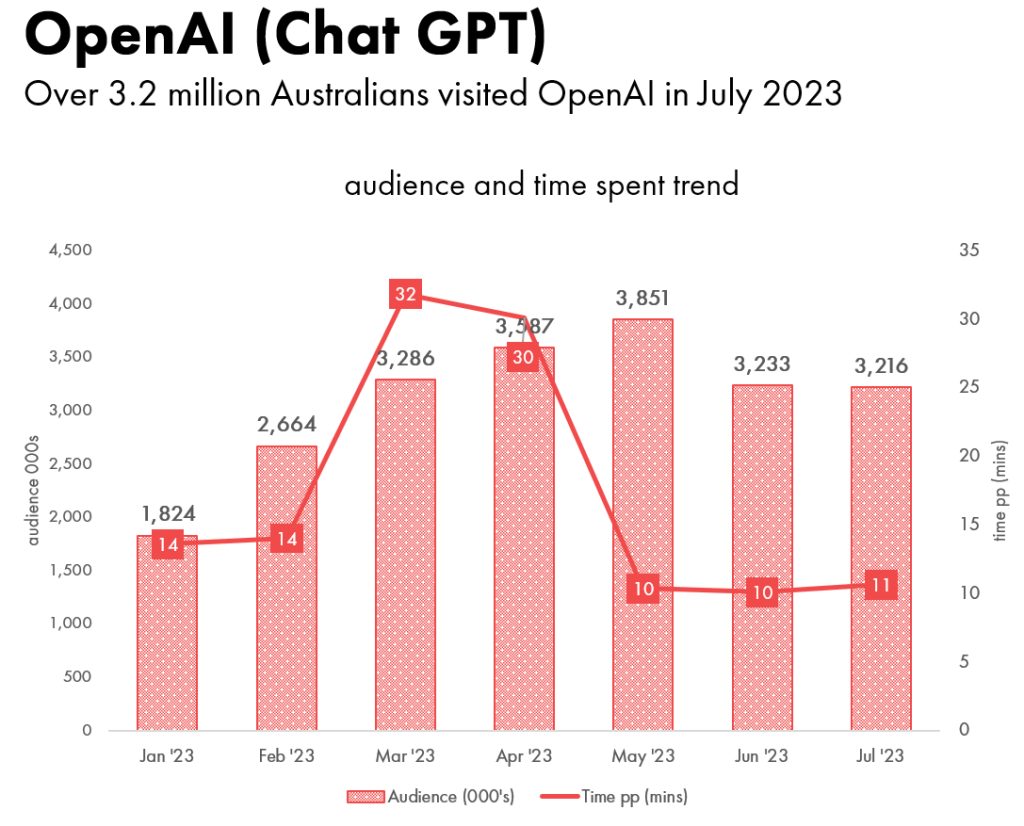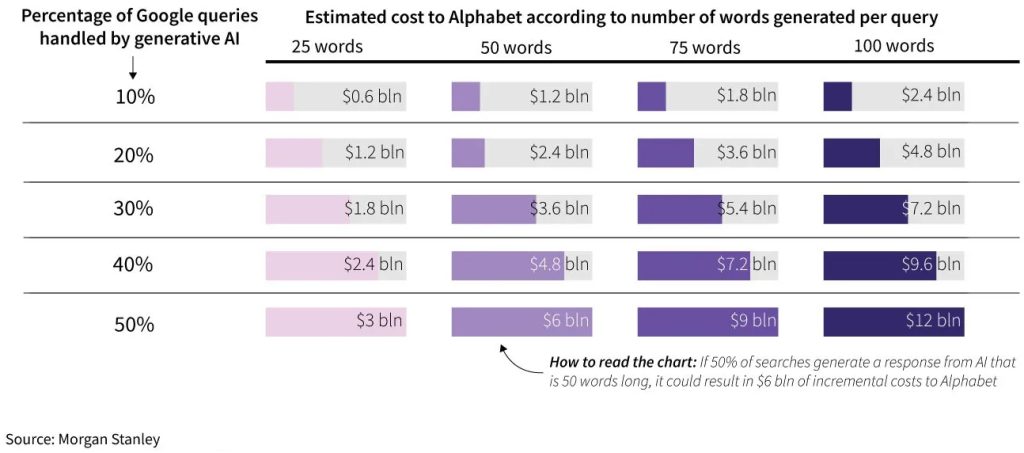Earlier this year we wrote an article with some background on, and the potential positives and negatives of the fast-evolving capabilities of artificial intelligence on our industry.
Since then, over the past few months we have seen increased engagement with AI chat bots such as Google Bard, Microsoft’s AI-powered Copilot and ChatGPT here in Australia. The foundation of these bots are large language models (LLMs), which are algorithms that can process natural language inputs and then predict the next word based on what it has already seen. The bots will then continuously predict the next words in their responses until its answers are complete.
We have been tracking some of the consumer engagements with ChatGPT in the monthly Ipsos Iris reports, as per the below:
 image source: Ipsos Iris
image source: Ipsos Iris
In terms of impact on our industry related to efficiency and effectiveness it’s still too soon to truly tell and we do know that the capabilities of machine learning have been leveraged for a number of years now – as per our recent submission to the Department of Industry Science and Resources’ consultation on Safe and Responsible AI.
Alongside the concerns raised in the above submission there is also now an increasing focus on the potential impacts on sustainability of the growing usage of these AI solutions. The resulting carbon emissions and costs from the increased computational efforts required is a challenge that the large tech companies are also grappling with – and our dedicated sustainability working group will be keeping an eye on this topic moving forwards.

As a follow-up to the original AI article, this week we spoke to Emily Smith – who is the Commercial Transformation Lead at Paramount ANZ, about some of her thoughts in and round this increasingly important topic.
What impacts, both negative and positive, could AI have on talent and careers for those in our industry?
AI will significantly impact careers in our industry and shift the needle on desired skillsets sought by companies. AI’s impact will vary based on occupation within our industry with low skilled jobs or those involving admin centric tasks which involve collecting & processing data at high risk of being replaced or else repositioned. The rise of AI may result in job displacement like what we have seen in the past with manufacturing and agriculture, however equally it may just result in a repositioning of roles within a specific field i.e., people may just perform different tasks.
“AI isn’t going to take your job, but someone who understands AI will” (Scott Galloway) – I believe that those who understand the benefits and limitations of AI will continue to thrive given they will recognise what AI lacks and where human performance is unmatched (for now anyhow) e.g., true cognition, developing social connection & managing people.
Positives:
Operational efficiency
AI will alleviate some of the admin centric tasks which consume a significant portion of the workforce’s time and arguably increase quality of outputs by removing risk of human error which can be rife in tasks such as reporting, Finance etc.
Re-framed roles & Creation of new roles
AI will force us to reimagine how the value of certain roles (such as Data Analysts), contribute value to our Companie’s success, considering how skillsets are transferable and equally what new skillsets are critical to fulfill reframed positions.
I’d anticipate future roles placing greater importance on human connection & cognition and higher-level thinking which requires memory, perception & intuition. Roles requiring these skillsets will become more in-demand and subsequently result in greater competition between companies to secure that talent.
I believe there will be a significant need for new roles which ensure Human Oversight of AI & at least in the short to medium term roles which direct and prompt AI to get to a desired outcome:
– Take marketing briefs as an example, Mark Ritson’s “90 per cent of marketers fail to brief agencies effectively, and their failures begin with a total lack of strategy”- we need to ensure the application of AI is addressing the true Business challenge.
– As an alternative example, if using AI to develop creative, how do we monitor quality of outputs both from an executional excellence POV but also to ensure there is no inherent bias.
Focus on strategic priorities
AI will be able to effectively execute on the strategic priorities defined by marketers and their Agencies, resulting in a more cohesive link between strategy and execution where there has traditionally been a disconnect. I’d expect this to result in a greater weight of focus on strategic tasks and in turn demand for these skillsets.
Personalisation at scale and delivery of a connected consumer experience are key strategic priorities for a vast array of Advertisers, and AI poses a huge opportunity to deliver increasingly relevant ads accounting for a non-linear consumer journey.
Negatives:
Aversion to change
Human’s inherently fear change and will be required to rapidly adapt and/or develop new skillsets – in the absence of the relevant support of companies’ this could pose significant issues to certain subsets of the workforce who have traditionally carried out the tasks AI will likely replace.
Echo chamber for bias
In the absence of human monitoring, AI could reinforce sub-conscious bias which exists in society for instance what pulls through in creative and content production. Companies need to ensure that they not only ensure human monitoring is in place but that the human monitoring is representative and accounts for our population’s diversity .
Human desire for instant gratification
Whether it be operational efficiencies or cost savings, we need to ensure that roles aren’t simply replaced without a clear understanding of the capability and limitations of AI. If adopted correctly, AI can play a complementary role to humans in our industry, but companies need to put significant focus on reviewing responsibilities & existing skillsets as well as process to support adoption and the transition in ways of working. For instance, a human role in counterbalancing the risk of a creative ‘dulling’ effect, developing governance around privacy standards to inform and control inputs informing AI and a cultivating a curious mindset to constantly question outputs, will be essential to extracting the best from AI.
